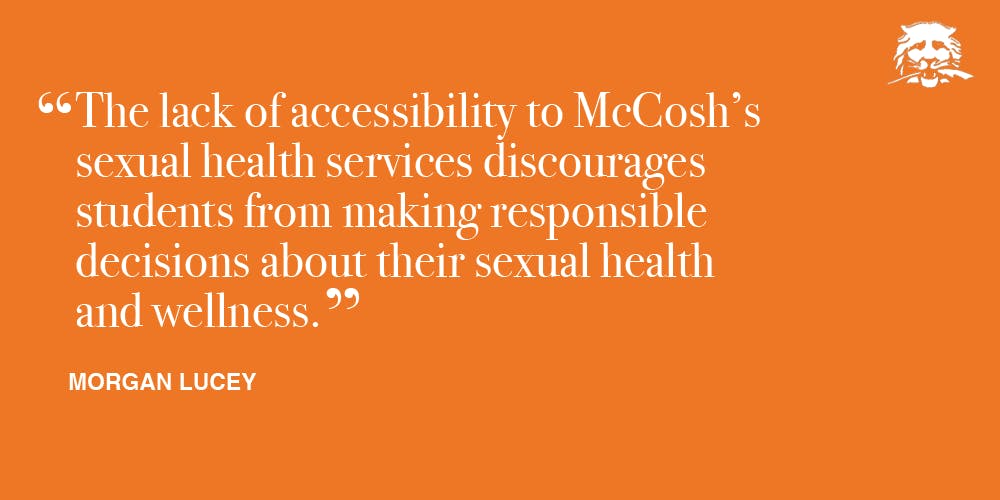In recent months, the University has implemented major reforms in student health care for Counseling and Psychological Services. These reforms include reducing wait times from three weeks to six days and employing a team of professionals trained to handle eating disorders. These actions are major steps forward in making the environment of the University more inclusive and helpful to students struggling with their mental health, but there are other aspects of the student health care system that need to be reformed. Specifically, the sexual health department at McCosh Health Center desperately needs to improve its accessibility and breadth of services.
At the time that this article was written, the next available appointment at McCosh for a birth control consultation appointment was two weeks in the future. This is a similar period to the wait times for CPS before reforms were enacted. Furthermore, two weeks only represents the time to obtain a prescription for the pill form of hormonal contraception. If one is seeking another form of contraception that requires a more invasive procedure, such as an intrauterine device or Nexplanon, there is an even longer wait time for the procedure after the initial consultation. Thus, students are discouraged from making responsible choices about safe sex because of the wait time for appointments. Decisions about becoming sexually active rarely occur over that long of a time span. By the time of an appointment, the student is likely to already have become sexually active.
Despite the available contraception methods — or perhaps, because of their inaccessibility — mistakes happen, which is why methods in emergency contraception exist. These methods are effective up to 72 hours after unprotected sex but are most successful within 24 hours of intercourse. Emergency contraception is available at McCosh but only with significant barriers. Although the clinic is open 24 hours a day, emergency contraception is only available during business hours, when a doctor or nurse trained in sexual healthcare is available. To obtain emergency contraception, one has to endure a conversation with a nurse or doctor about safe sex. When one is so vulnerable regarding their sexual activity, having to speak with a relative stranger at length about it only makes an already uncomfortable situation worse.
To provide a patient with the appropriate care, a physician or nurse must understand the nature of why the patient is seeking emergency contraception, which is most easily accomplished through conversation. However, this should be done efficiently and impersonally, without any sense of judgment, so that the patient does not feel further embarrassment or vulnerability regarding the situation. Even after going through this conversation, obtaining the morning-after pill still costs $30. Emergency contraception is available at the CVS on Nassau Street without such a confrontation, but the price is raised to about $50. Neither price is trivial nor affordable for the entire student population. Based on the manufacturing and distribution of the morning-after pill, it may be difficult to lower the price. However, this does not account for the fact that McCosh fails to offer subsidization or a payment plan to students with financial need, barring them from what may be a crucial step in reproductive autonomy. Seeking the morning-after pill is the responsible choice after having unprotected sex and should be encouraged by the student health care system.
At the time that this article was written, the wait time for an STI/STD screening appointment was only four days. This indicates a recognition of the fear and apprehension one faces if they believe they might have an STI/STD, through limiting the time one has to wait to obtain an answer. McCosh should be lauded for maintaining this low wait time. However, there is not widespread understanding among the student body about how the screening appointment operates. If one tests positive, they receive a phone call with test results. If one tests negative, they never receive a follow-up. Many students are left to wonder because they aren’t informed that no news is good news. McCosh should provide a more thorough explanation of how their services work to avoid such speculation and apprehension.
The lack of accessibility to McCosh’s sexual health services discourages students from making responsible decisions about their sexual health and wellness. The current system serves to increase stigma and discomfort when seeking both preemptive contraception and emergency contraception. Furthermore, the failure to disseminate knowledge about how such services work only heightens fear and apprehension in the student body. Thus, the same level of effort that went into the much-needed mental health reform should also go into reforming sexual health services.
Morgan Lucey is a junior studying neuroscience from Scottsdale, Ariz. She can be reached at mslucey@princeton.edu.








